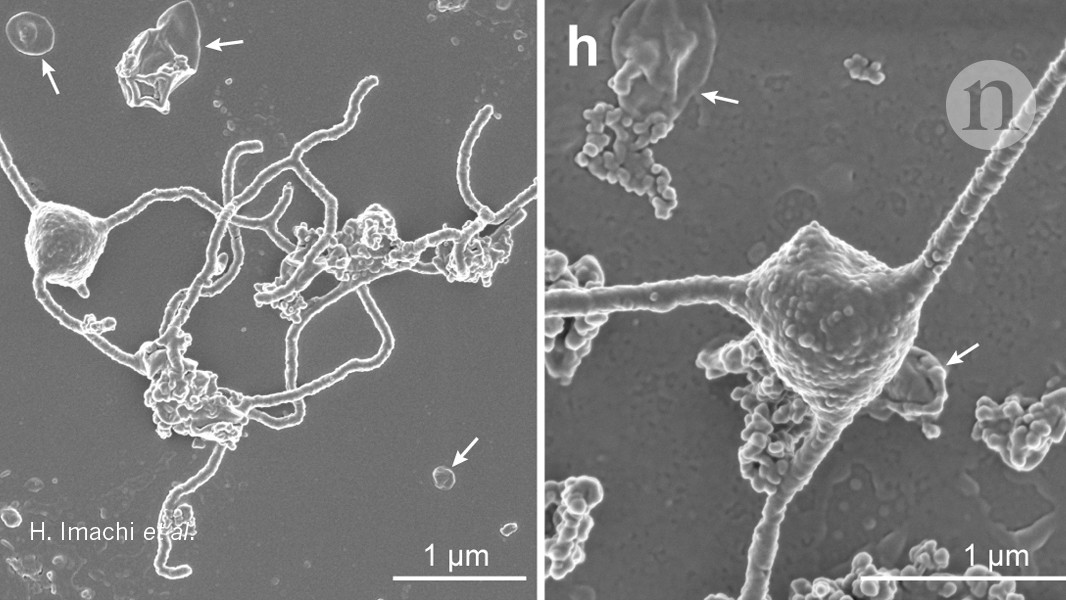Scientists glimpse oddball microbe that could help explain rise of complex life
- Select a language for the TTS:
- UK English Female
- UK English Male
- US English Female
- US English Male
- Australian Female
- Australian Male
- Language selected: (auto detect) - EN

Play all audios:

NEWS 09 August 2019 Scientists glimpse oddball microbe that could help explain rise of complex life ‘Lokiarchaea’, previously known only from DNA, is isolated and grown in culture. By
Jonathan Lambert Jonathan Lambert View author publications You can also search for this author in PubMed Google Scholar
Twitter Facebook Email Access through your institution Buy or subscribe Biologists have for the first time captured and grown an elusive type of microbe that is similar to those that might
have given rise to all complex life on Earth.
Access options Access through your institution Additional access options: Log in Learn about institutional subscriptions Read our FAQsContact customer support
Nature 572, 294 (2019)
doi: https://doi.org/10.1038/d41586-019-02430-w
References Imachi, H. et al. Preprint at https://doi.org/10.1101/726976 (2019).
Spang, A. et al. Nature 521, 173–179 (2015).
Article PubMed Google Scholar
Download references
Reprints and permissions
Related Articles The trickster microbes that are shaking up the tree of life
The band of biologists who redrew the tree of life
Subjects Evolution Microbiology Latest on: Evolution A new Mongolian tyrannosauroid and the evolution of Eutyrannosauria
Article 11 JUN 25
Ancient DNA reveals a two-clanned matrilineal community in Neolithic China
Article 04 JUN 25
Rare ‘ambidextrous’ protein breaks rules of handedness
News 29 MAY 25
Microbiology RIFINs displayed on malaria-infected erythrocytes bind KIR2DL1 and KIR2DS1
Article 11 JUN 25
Skyrocketing mpox outbreak in Sierra Leone raises fears of wider spread
News 06 JUN 25
Exclusive: Inside the thriving wild-animal markets that could start the next pandemic
News Feature 03 JUN 25
Jobs Open Rank Faculty Position (Tenure/Teaching/Research Stream) - School of Science and Engineering Shenzhen, China
The Chinese University of Hong Kong, Shenzhen (CUHK Shenzhen)
Postdoctoral fellow in neuroscience Postdoctoral fellow at Tulane University Neuroscience, Cerebrovascular, Ischemia, Dementia, Traumatic brain injury.
New Orleans, Louisiana
Tulane University - neuroscience and stroke research
Chair (Researcher + Lecturer) position in Translational Cancer Research Excellence Research Chair (full-time professor) position to develop both ambitious research in kidney cancer and
teaching programs in oncology.
Bordeaux (Ville), Gironde (FR)
INSERM U1312 BRIC
Cross-disciplinary Post-doctoral Position Cleveland, Ohio (US)
Cleveland Clinic
Birmingham Springboard Fellow - College of Medicine and Health University of Birmingham CMH offers competitive 2-year postdoctoral fellowships for early career researchers to boost their
independent research.
Edgbaston (Local area), Birmingham
University of Birmingham